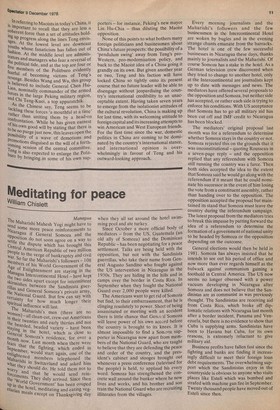Meditating for peace
William Chislett
Managua The Maharishi Mahesh Yogi might have to send some more peace reinforcements to Nicaragua if General Somoza and the °PPosition do not soon agree on a way to settle the dispute which has brought this Central American Republic of two million People to the verge of bankruptcy and civil war. So far the Maharishi's followers — 108 members of his World Government of the Age of Enlightenment are staying in the Managua Intercontinental Hotel — have kept the. two sides apart except for intermittent between the Sandinista guernllas and General Somoza's private army, the National Guard. But few can say with certainty for how much longer their Spiritual influence will last. The Maharishi's men (there are no !'omen)_ all clean-cut, crew-cut Americans Intheir twenties and early thirties and not the bearded, beaded variety — have been slaying in the hotel, which is close to General Somoza's residence, for over a In_ onth Last month when there were tears that the fighting, which ended in 'september, would start again, one of the enlightened members telephoned the Maharishi in Switzerland and asked him What they should do. He told them not to Worry and that he would send reinforcements. They duly arrived. Since then the World Government' has been couped uP in the hotel, meditating and eating vegetarian meals except on Thanksgiving day when they all sat around the hotel swimming pool and ate turkey. Since October a more official body of mediators — from the US, Guatemala (an old ally of Somoza) and the Dominican Republic — has been negotiating for a peace settlement. Talks are being held with the opposition, but not with the Sandinista guerrillas, who take their name from General Augusto Sandino who fought against the US intervention in Nicaragua in the 1930s. They are hiding in the hills and in camps over the border in Costa Rica. In September when they fought the National Guard over 2,000 people were killed.
The Americans want to get rid of Somoza but find, to their embarrassment, that he is clinging resolutely to power. Short of being assassinated or meeting with an accident there is little chance that Gen.li al Somoza will leave power of his own accord before the country is brought to its knees. It is almost impossible to find a Somoza supporter in Nicaragua now apart from members of the National Guard, who are taught to believe that they are defending the peace and order of the country, and the president's cabinet and stooges brought out whenever a press conference (televised for the people) is held, to applaud his every word. Somoza has strengthened the concrete wall around the bunker where he now lives and works, and his brother and son train the National Guard who are recruiting illiterates from the villages. Every morning journalists and the Maharishi's followers and the few businessmen in the Intercontinental Hotel are woken by bugles and in the evening strange chants emanate from the barracks. The hotel is one of the few successful businesses in Nicaragua these days, thanks mainly to journalists and the Maharishi. Of course Somoza has a stake in the hotel. As a German television crew discovered when they tried to change to another hotel, only at the Intercontinental are journalists kept up to date with messages and news. The mediators have offered several proposals to the opposition and Somoza, but neither side has accepted, or rather each side is trying to enforce his conditions. With US acceptance that Somoza has to go all military aid has been cut off and IMF credit to Nicaragua has been blocked.
The mediators' original proposal last month was for a referendum to determine whether Somoza stays in the country or not. Somoza rejected this on the grounds that it was unconstitutional — quoting Rousseau in a seven-page reply — and the opposition replied that any referendum with Somoza still running the country was a farce. Then both sides accepted the idea to the extent that Somoza said he would go along with the referendum if it meant that he could nominate his successor in the event of him losing the vote from a constituent assembly, rather than handing over to the opposition. The opposition accepted the proposal but maintained its stand that Somoza must leave the country during the referendum campaign. The latest proposal from the mediators tries to break this impasse by putting forward the idea of a referendum to determine the formation of a government of national unity to be headed by Somoza or the opposition depending on the outcome.
General elections would then be held in 1981. Somoza has always insisted that he intends to see out his period of office and now more than ever regards himself as the bulwark against communism gaining a foothold in Central America. The US now seems no longer obsessed with a power vacuum developing in Nicaragua after Somoza and does not believe that the Sandinistas are as communist as was previously thought. The Sandinistas are receiving aid from Costa Rica, which broke off diplomatic relations with Nicaragua last month after a border incident, Panama and Venezuela, but there is no evidence to show that Cuba is supplying arms. Sandinistas have been to Havana but Cuba, for its own reasons, is extremely reluctant to give military aid.
Business profits have fallen fast since the fighting and banks are finding it increasingly difficult to meet their foreign loan debt requirements. The overwhelming support which the Sandinistas enjoy in the countryside is obvious to anyone who visits places like Esteli which was bombed and strafed with machine gun fire in September. Twenty thousand people have moved out of Esteli since then.














































 Previous page
Previous page